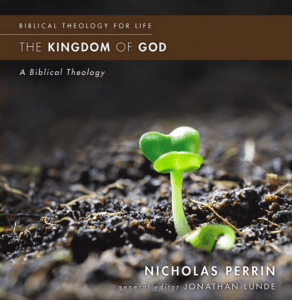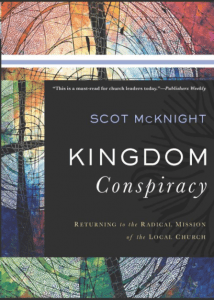 The burden of my new book, Kingdom Conspiracy, is answering this question: What does “kingdom” mean?
The burden of my new book, Kingdom Conspiracy, is answering this question: What does “kingdom” mean?
I want to begin this session by tapping on a few doors to see who opens the door and asking them what kingdom means. This gives us a sampling of kingdom usage in the church today. It is in no particular order, and we can discuss each but I have tried to give a brief label to how the kingdom is being used at the end of each citation.
Ed Stetzer, Southern Baptist leader
In his nice little sketch about megachurches vs. house churches, Ed Stetzer, well known research for LifeWay among the Southern Baptists, was trotting along at a nice pace about the church and house churches and church planting but then when he began to talk about all the forms of the church together it became kingdom. Why the change of terms? [1]
For him “kingdom” is the sum total of the churches in this world.
Kingdom = church universal
Stanley Hauerwas, Anabaptist, Methodist, Episcopalian, Catholic, ethicist.
This kingdom sets the standard for the life of the church, but the life of the kingdom is broader that even that of the church. …The church is not the kingdom but the foretaste of the kingdom. In the church the narrative of God is lived in a way that makes the kingdom visible. The church must be the clear manifestation of a people who have learned to be at peace with themselves, one another, the stranger, and of course, most of all, God. There can be no sanctification of individuals without a sanctified people. Like apprentices who learn their craft by working alongside the master-craftsman, we Christians need exemplars or Saints whose lives in body the kingdom way. If we lack such exemplars, the church cannot exist as a people who are pledged to be different from the world.”
SH A Peaceable Kingdom 97.
Kingdom is a society of perfection, perhaps a power (?) or an order but not the church, which is an inferior manifestation of the kingdom. But also the church is not the world.
Adelita Garza, a female evangelist, church planting pastor:
She declared that the answer to expanding ministry is the young women in Bible colleges and already in the pew — only they need leaders to believe in them, perhaps even more than they believe in themselves.
“This is not a gender issue, this is a kingdom of God issue,” she said.“What resources has God put in our hand to win this country, our world, for Jesus?” Garza asked. “The resource is every man, woman and young person who has been called by God to plant a church. If we use all our resources, our potential has just exponentially grown.”[2]
Kingdom here seems to suggest an ecclesial renewal movement of equality, a society marked by the way God wants life to be lived now.
D. Bonhoeffer, Christmas Night sermon, 25 December 1940 (DBW 16.616).
It is no longer a worldly throne and kingdom as it once was [under Israel] but a spiritual throne and kingdom. Where are Jesus’ throne and kingdom? They are where he himself is present, reigns, and governs with his word and sacrament, in the church, in the congregation…. We are called into this kingdom. We can find it, within the church, in the community of the faithful, when we receive the word and sacrament of the Lord Jesus Christ and submit to his authority, when we recognize the child in the manger as our Savior and Redeemer and let him bestow on us a new life grounded in love.
Kingdom here is very close to church but it is distanced from Israel (as was the case in Germany at least from G. Dalman on — see below). He is riding an early wave of the view that shaped George Ladd.
Yet, D. Bonhoeffer, letter “To the Young Brothers in Pomerania,” after his days in the underground seminary training of Confessing Church pastors, said:
With this word [of commitment to the Confessing Church] we were willing to pass through struggle, through suffering, through poverty, through sin, and through death to finally reach God’s eternal kingdom (DBWE 15.30).\
Kingdom here is very close to heaven or the new heavens and the new earth, or the future kingdom of God (on earth? in heaven?).
Gustav Dalman, The Words of Jesus, 137, 139, who wants kingdom to mean power, salvation, blessings of the new age, an eschatological reality (all italics mine):
There was already in existence, prior to the time of Jesus, a tendency which laid little stress on the Jewish national element in the hope for the future. This aspect of the future hope Jesus thrust still further into the background, placing the purely religious element decisively in the foreground, and He thereby_extended the conception of the “sovereignty of God” so as to include within it the blessings mediated by this sovereignty. For Him the sovereignty of God meant the divine power which, from the present onwards with continuous progress, effectuates the renovation of the world, but also the renovated world into whose domain mankind will one day enter, which is even now being offered, and therefore can be appropriated and received as a blessing.
It was not merely the content of the conception which forms the kernel of our Lord’s teaching that was new and original, but also His application of the term, despite the fact that the phrase selected originally belonged to the religious vocabulary of the Jews. The theocracy about to make its entrance into the world was something more than a gratifying realization of the hopes entertained regarding it [in the Jewish tradition]; it was a creative force bringing new ideas in its train.
Dalman: it is not what Jews thought it would be; it was not Israel; it was a power of God now at work – the future making its way into the present in salvation power.
Dan Jesse, a Kuyperian blogger, thinks with many in the American evangelical movement, that kingdom is much, much bigger than church. He says:[3]
Today there is a fundamental error occurring in the way we think about the Church. We confuse and collapse two concepts into one, leading us down a dangerous path. These concepts are the Church of Christ and the Kingdom of Christ. “Kuyper makes much of the fact that the Kingdom of Christ is much bigger than the institutional church.” (Mouw, 57) When we hold that the whole domain of Christ is in the institution of the Church, we limit the reach of Christ in His world and make Christ into something that He is not; an idol that only exerts power over a small part of Creation.
The Church is only a small part of the Kingdom of Christ’s Kingdom. It is important and has a great role to fulfill, but is not the fullness of the Kingdom. The church is where we as believers gather to worship – where we are shaped by the preaching of the Word, by participation in sacraments, by instruction in the church’s tradition and teaching, and by less formal patterns of fellowship. (57)
Kingdom = God’s common grace reign in this world, but much bigger than the church, which is but one small element of God’s kingdom.
John Howard Yoder, in what can be called his most important work, The Politics of Jesus, in a chapter called “The Kingdom Coming,” concludes with these lines that I think represent his view of kingdom and church:
Jesus was, in his divinely-mandated… prophethood, priesthood, and kingship, the bearer of a new possibility of human, social, and therefore political relationships….
This might sound like a Niebuhrian or Kuyperian theory at work but we must see his focus in this kind of language. He does not ignore the world, but instead sees the world through the lens of kingdom and church. The church is what God wants for the whole world but the kingdom is at work in connection with Jesus. I continue now in his words:
No such slicing [by the historical critics of the Gospels] can avoid his call to an ethic marked by the cross, a cross identified as the punishment of a man who threatens society by creating a new kind of community leading a radically new kind of life (52, 53).
Here kingdom themes, which focus more on the ethical and social than on the soteriological or Christological, come to their natural gathering in the community of Jesus, that is, the church.
Yet, when I look at his discussion in his Theology of Mission, I see more of a focus on the kingdom as a future ideal into which the church is learning to live in the here and now; he also suggests kingdom as a cosmic idea. Here the church is but a “sign” of the kingdom (282-288; admittedly, these are his incomplete thoughts in response to other missiologists.
Yoder gets much closer to Kuyper at some points.
On my blog, 10.9, by Peter TeWinkle:[4]
The shift [to kingdom language] was a definite part of my seminary training (2000-2002). Missional language was a big part of the conversation and kingdom was at the center of that. It was that kind of “down to earth” language that finally drew me into pastoral ministry. There was something for us to do rather than simply believe. However, along the way I have felt the same tension that many others have given into. That is, “If what God really wants is peace and justice, I’ll just do that. Who needs the church anyway?”
Kingdom, as it is being used, seems to have little to do with the church. The church can, if it chooses to do so, join in the great social peace and justice kingdom work if it chooses to.
Now my conclusions:
Everyone uses kingdom to their own advantage, or agenda… but few are rooting their ideas in the Bible. Few have looked at the Old Testament or contemporary Jewish sources (the rabbis are later) to see what “kingdom” meant at the time of Jesus when he used the term.
Instead, we have learned to use “kingdom” on the basis of how kingdom is being used as expressing a variety of theological ideas, not least how that term brings to expression how we think church and state relate and individual Christian and culture relate.
Here are some major uses at work in the church today:
Kingdom is an ethical system applicable to and worked out in the public and state: both progressives and conservatives use the term this way.
Kingdom is the power of God at work in the world. (Wherever that power is at work, there is kingdom.)
Kingdom is the church or, just the opposite, the kingdom is not the church but includes the church in a much larger story.
Kingdom is an ideal, a utopia, for the present but for others it is also heaven, the final perfection planned by God.
Kingdom is a creation doctrine concerned with the renewal of all things – including physical, social, moral, political, etc (Kuyper).
In this sense “kingdom” is language that “sanctifies” vocation and “justifies” our passions and “narrates” a story that gives meaning to all we do.
My big question:
Where, one might ask, does one locate “kingdom” in Systematic Theology classes?
Eschatology: future (and some present)?
Christology?
Soteriology?
God as creator?
Ecclesiology?
A problem today is this reductionism, this location of kingdom in just one of the loci of Systematics.
[1] http://www.christianitytoday.com/edstetzer/2014/september/learning-from-megachurch-vs-house-church-debate-3-ways-to-b.html
[2] http://100.ag.org/centennial/second-church-planting-panel-offers-fresh-views/
[3] http://blog.emergingscholars.org/2014/10/the-role-of-the-church/
[4] http://www.patheos.com/blogs/jesuscreed/2014/10/09/kingdom-then-kingdom-now/#disqus_thread











